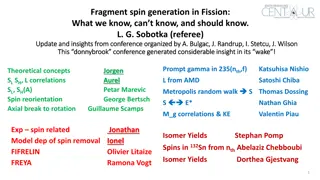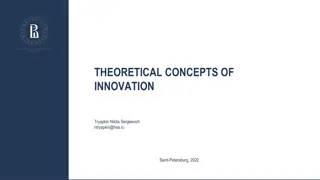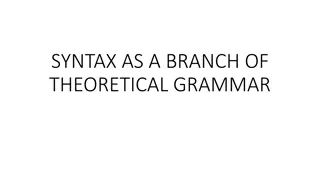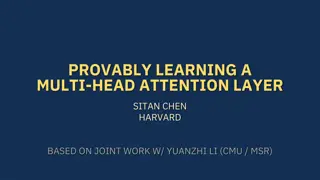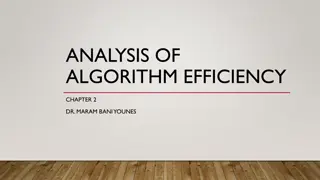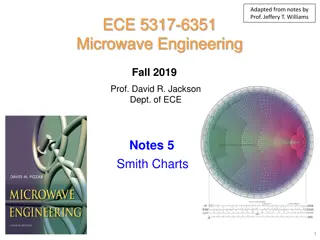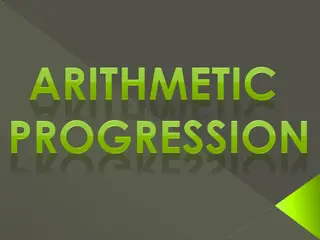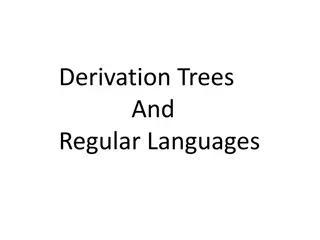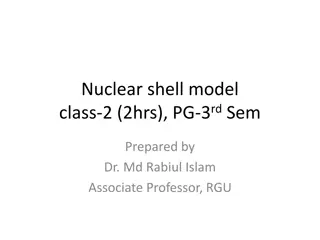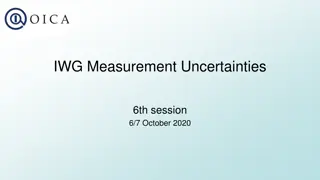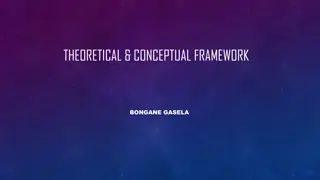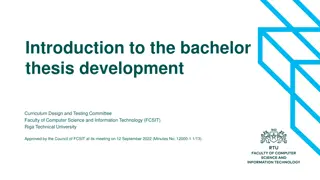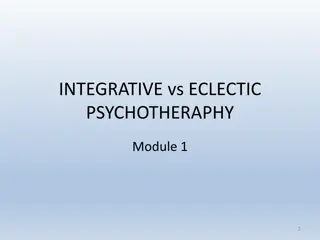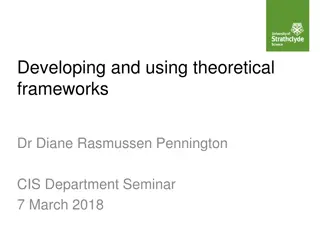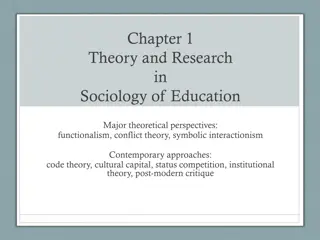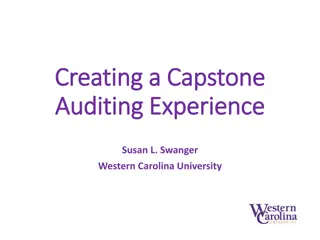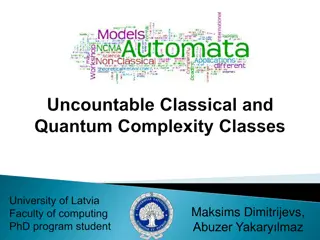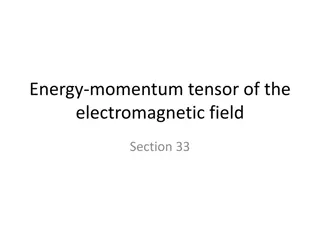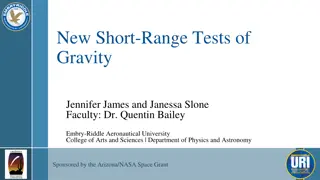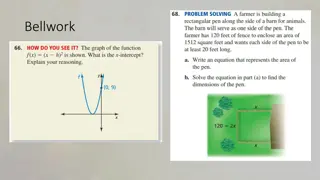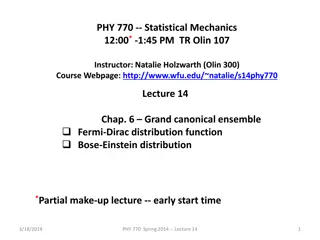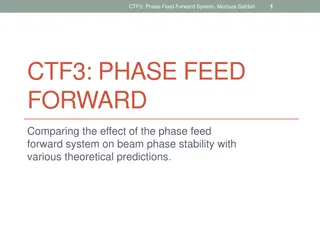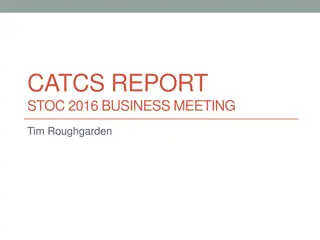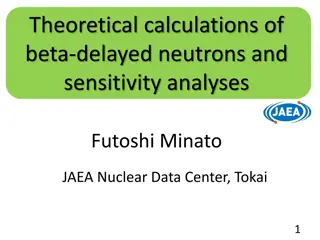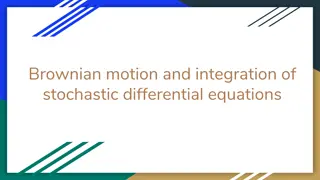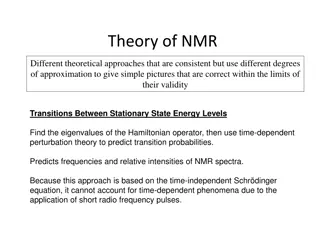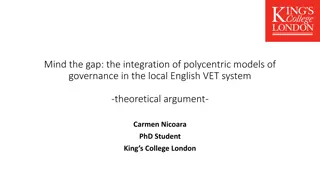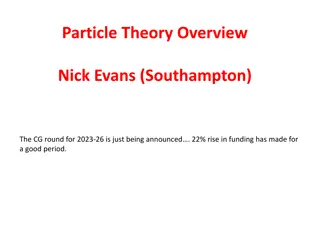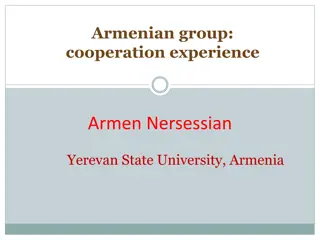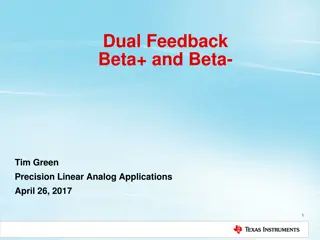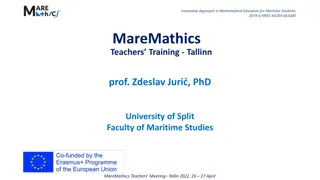Insights on Fragment Spin Generation in Fission: What We Know
Considerable insight was generated from a recent conference on fission, shedding light on crucial theoretical and experimental aspects. Key topics include angular momentum, fission-fragment spin references, and the dynamics of nuclear fission. Theoretical advancements like the TDSLDA model and super
3 views • 41 slides
Understanding Theoretical Concepts of Innovation and Diffusion Theories
Explore the theoretical concepts of innovation, comparing innovation vs. innovativeness and delving into the diffusion of innovation theory by Rogers. Discover how innovation, innovativeness, and the diffusion of innovation theory play crucial roles in organizational settings, impacting technology a
8 views • 19 slides
Understanding Syntax in Theoretical Grammar
Syntax, as a branch of theoretical grammar, explores the combination of words in phrases and sentences, focusing on their relationships and functions in communication. Basic syntactic notions, such as syntactic units, syntactic meaning, and syntactic relations, play a crucial role in shaping the str
5 views • 17 slides
Insights into Theoretical English Grammar
The theoretical English grammar delves into the subject matter of grammar, including systemic conceptions, grammatical forms, categories, paradigms, and morphological means. It discusses the constituent parts of language – phonology, lexicology, and grammar. The grammatical structure covers morpho
7 views • 26 slides
Overview of Stilistik in Bachelor's Studies
Stilistik in a Bachelor's program covers theoretical basics, stylistic concepts, micro and macro stylistics, and key texts in the field. It explores stylistic analysis, linguistic disciplines, communication styles, and the impact of style on various forms of expression including everyday communicati
6 views • 63 slides
Power System Fault Calculation and Protection Analysis
In this technical document, we delve into the calculation of fault current and fault apparent power in symmetrical three-phase short circuit scenarios within power systems. Through detailed equivalent circuit diagrams, reactance calculations, and per unit value derivations, the fault current and app
5 views • 15 slides
Evolution of Development Communication: Theoretical Frameworks and Applications
Exploring the interdisciplinary field of Development Communication, this seminar delves into theoretical frameworks, methodological applications, and practical implications at the World Bank. It reflects on the evolution, theories, and practices underlying Development Communication paradigms, with a
4 views • 57 slides
Understanding Multi-Head Attention Layers in Transformers
Sitan Chen from Harvard presents joint work with Yuanzhi Li exploring the provable learnability of a multi-head attention layer in transformers. The talk delves into the architecture of transformers, highlighting the gap between practical success and theoretical understanding. Preliminaries, prior w
3 views • 38 slides
Understanding Notional Parts of Speech: Adjectives and Adverbs
Exploring the notional parts of speech, this text delves into the properties and functions of adjectives and adverbs. Adjectives describe the qualities of substances, while adverbs characterize actions or qualities. Adjectives can be qualitative or relative, with degrees of comparison, while adverbs
1 views • 25 slides
Understanding Algorithm Efficiency Analysis
In this chapter, Dr. Maram Bani Younes delves into the analysis of algorithm efficiency, focusing on aspects such as order of growth, best case scenarios, and empirical analysis of time efficiency. The dimensions of generality, simplicity, time efficiency, and space efficiency are explored, with a d
1 views • 28 slides
Understanding Smith Charts in Microwave Engineering
Explore the concepts of Smith Charts in microwave engineering, focusing on the Generalized Reflection Coefficient, Complex Plane representation, Z-Chart analysis, and equation derivations for circles in the Z-Plane. Learn how to interpret impedance transformations and visualize impedance matching us
0 views • 29 slides
Understanding Arithmetic Progression (AP) Concepts
Arithmetic Progression (AP) is a sequence where each term is derived by adding a fixed number to the previous term. This concept is explored through common difference, identifying terms in an AP, finding value of unknowns, sum of terms formula, and derivations. Examples and problems demonstrate the
1 views • 14 slides
Understanding Derivation Trees and Regular Languages in Formal Language Theory
Derivation trees play a crucial role in formal language theory, aiding in visualizing the process of deriving strings from a formal grammar. The concept of leftmost and rightmost derivations, along with their respective tree representations, provide insights into how strings are generated using gram
1 views • 15 slides
Theoretical Derivation and Application of Nuclear Shell Model in Quantum Physics
Brought to you by Dr. Md. Rabiul Islam, Associate Professor at RGU, this presentation delves into the theoretical derivation of the shell model using Schrodinger wave equations in the presence of specific potentials. Exploring the solutions for the wave equation and explaining the role of quantum nu
1 views • 14 slides
IWG Measurement Uncertainties: Justification of Impact Quantities
Explore the justification of main impact quantities in IWG Measurement Uncertainties session held on 6th and 7th October 2020. The analysis includes factors such as deviation from centered driving, start of acceleration, speed variations, load variations, background noise, temperature effects on noi
3 views • 25 slides
Understanding Theoretical and Conceptual Frameworks in Research
The theoretical and conceptual frameworks in research play vital roles by grounding studies in theoretical constructs, enhancing rigor and empiricism, and guiding the research process. The theoretical framework provides a blueprint based on existing theories, guiding researchers in developing their
0 views • 12 slides
Understanding Energy Loss Due to Hysteresis in Magnetic Materials
In the realm of magnetism, magnetic materials exhibit unique behavior even when not magnetized. Ewing's theory sheds light on the alignment of molecular magnets in relation to an applied magnetizing field, resulting in energy consumption. This leads to hysteresis loss, where energy is dissipated as
0 views • 8 slides
Importance of Bachelor Thesis in Computer Science Education
The Bachelor Thesis plays a crucial role in assessing students' achievement of study outcomes in Computer Science and Information Technology programs. It serves as a tool to strengthen theoretical knowledge, demonstrate problem-solving skills, and provide evidence of academic competence in the chose
0 views • 16 slides
Understanding Integrative and Eclectic Psychotherapy Approaches
Integrative Psychotherapy emphasizes treating individuals holistically across affective, behavioral, cognitive, and spiritual dimensions. It incorporates various theoretical perspectives like psychodynamic, client-centered, behaviorist, and cognitive therapies. Common factors in psychotherapy play a
3 views • 16 slides
Understanding and Developing Theoretical Frameworks for Research
Explore the concept of theoretical frameworks through examples and definitions, including how to integrate theories into empirical research. Learn about creating conceptual frameworks, the importance of arguments in research, and the criteria for rigorous research design. Discover the significance o
0 views • 40 slides
Theoretical Perspectives in Sociology of Education
Exploring major theoretical perspectives such as functionalism, conflict theory, and symbolic interactionism along with contemporary approaches like code theory, cultural capital, and status competition. The functionalist theory emphasizes social cohesion and maintaining social order through educati
3 views • 14 slides
Understanding Probability: Experimental and Theoretical Concepts
Probability is the measure of the likelihood of an event happening, with experimental and theoretical probability being key concepts. Experimental probability involves determining probabilities through experience or experiments, while theoretical probability can be calculated without prior experienc
2 views • 23 slides
Enhancing Auditing Experience through Real-World Case Studies
Students find theoretical auditing courses less engaging. By introducing real, local, privately-owned company case studies early in the semester, motivation and understanding improve. This approach provides a practical and relatable learning experience, addressing the existing issues with theoretica
0 views • 12 slides
Theoretical Studies on Recognizing Languages
Various models such as Deterministic Turing Machines, Probabilistic Models, and Quantum Classes are explored for recognizing languages, with discussions on regular, nonregular, and uncountable languages. Theoretical concepts like bounded-error recognition, computational complexities, and enumeration
0 views • 28 slides
Understanding the Energy-Momentum Tensor of the Electromagnetic Field
Exploring the intricacies of the energy-momentum tensor of the electromagnetic field, including its components, symmetries, and implications on field interactions and invariants. Delve into the mathematical derivations and transformations involved in studying this fundamental concept in electromagne
0 views • 19 slides
Investigating Immiscible Fluids: Layers Formation and Interface Motion
The report explores the formation of layers in a beaker containing immiscible fluids such as water and vegetable oil. It delves into the theoretical and experimental aspects, discussing the chemical properties, layer creation limits, interface motion upon disturbance, and the strengths and weaknesse
2 views • 6 slides
Short-Range Tests of Gravity: Theoretical Physics Project Overview
This project focuses on calculating modifications to the Newtonian gravitational force through experimental short-range tests of gravity. Utilizing the Standard-Model Extension (SME) test framework to search for potential violations of General Relativity and Newtonian Gravity. Key objectives include
1 views • 7 slides
Quadratic Formula Applications and Problem-solving Scenarios
Explore the applications of the quadratic formula through real-life scenarios involving jugglers, archers, and mathematical derivations. Learn how to analyze the discriminant and solve quadratic equations to find solutions in physics and target shooting. Discover the principles behind the formula an
0 views • 14 slides
Grand Canonical Ensemble in Statistical Mechanics: Fermi-Dirac Distribution
Exploring the Fermi-Dirac distribution function and the Bose-Einstein distribution in the context of the grand canonical ensemble for non-interacting quantum particles. The lecture delves into the impact of particle spin on energy spectra, enumeration of possible states, self-consistent determinatio
0 views • 33 slides
Phase Feed Forward System: Analyzing Beam Phase Stability and Theoretical Predictions
Exploring the impact of phase feed forward systems on beam phase stability through comparisons with theoretical predictions and simulations of increasing limitations. Testing the accuracy of theoretical gain factors and assessing performance using global gain factors. Utilizing specific data files a
0 views • 58 slides
Committee for the Advancement of Theoretical Computer Science (CATCS) - Overview and Initiatives
CATCS, the Committee for the Advancement of Theoretical Computer Science, plays a crucial role in connecting the TCS community with funding agencies and other research communities. Through various efforts like recruiting, serving on panels, and enhancing TCS entries on Wikipedia, CATCS aims to promo
0 views • 10 slides
Theoretical Calculations of Beta-Delayed Neutrons and Sensitivity Analyses
In this talk by Futoshi Minato from JAEA Nuclear Data Center, topics covered include delayed neutron emission probabilities, incident neutron energy dependence, sensitivity analysis with JENDL evaluated libraries, and important precursors in r-process nucleosynthesis. Theoretical calculations are pr
0 views • 27 slides
Understanding Stochastic Differential Equations and Numerical Integration
Explore the concepts of Brownian motion, integration of stochastic differential equations, and derivations by Einstein and Langevin. Learn about the assumptions, forces, and numerical integration methods in the context of stochastic processes. Discover the key results and equations that characterize
0 views • 6 slides
Insights into Theoretical Approaches in NMR Spectroscopy
Theoretical approaches in NMR spectroscopy encompass diverse methods, each with varying degrees of approximation but yielding correct results within their validity. Techniques such as transition probabilities using the time-dependent perturbation theory, Zeeman interaction for energy level transitio
0 views • 32 slides
Integration of Polycentric Models in English VET System: Theoretical Framework
The theoretical argument explores the free-riding problem in training, proposing a polycentric model of governance to address it. It discusses the role of Local Enterprise Partnerships (LEPs) in overcoming this challenge. Additionally, an apprenticeship theoretical framework and the concept of train
0 views • 10 slides
Particle Theory Overview: Funding Rise and Academic Quality Boost in UK Theoretical Physics
The recent announcement of a 22% rise in funding for UK theoretical physics marks a positive period for the field. The PPGP(T) Panel chaired by Nick Evans of Southampton has seen a growth in academic numbers, quality, and leadership since 2019. Phenomenology plays a crucial role in guiding search st
0 views • 19 slides
Understanding Probability: Learning Outcomes and Examples
This content delves into the study of probability, covering topics such as representing probabilities of simple and compound events, calculating relative frequencies, multi-step chance experiments, theoretical and experimental probabilities. It explains concepts like chance experiments, sample space
0 views • 31 slides
Challenges Faced by Theoretical Physics in Armenia
The field of theoretical physics in Armenia has faced challenges such as a decline in the number of active theorists, an imbalance in age distribution, and a loss of internal collaborations leading to integration with Western groups. This has resulted in the need for young talents to pursue opportun
0 views • 21 slides
Precision Linear Analog Circuit Analysis
Explore the detailed analysis of a precision linear analog circuit, featuring dual feedback configurations, beta values, control loop derivations, and loop gain calculations. The content covers key components, such as operational amplifiers and resistors, and explains how to derive closed-loop gain,
0 views • 18 slides
Innovative Approach in Mathematical Education for Maritime Students
Explore the innovative approach in mathematical education for maritime students as presented during the MareMathics Teachers Training and Meeting in Tallinn. The sessions covered topics such as mathematical applications in thermodynamics, including partial derivatives, derivations, and integrals wit
0 views • 11 slides
